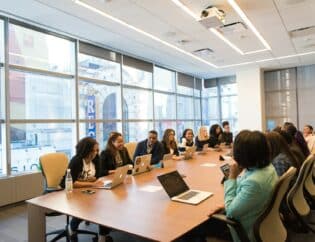The Limitations of AI
AI and automation have revolutionized various industries, taking over repetitive tasks, data analysis, and even complex problem-solving to an extent. While AI can perform these tasks with remarkable efficiency, it lacks the ability to replicate human emotions, critical thinking, and interpersonal interactions. The unique value of soft skills lies in their inherently human nature, which AI cannot emulate.
- Resilience: Resilience refers to the ability to adapt to change and recover quickly from setbacks. In a dynamic work environment, resilience is key to maintaining productivity and morale. Employees who can navigate challenges and bounce back from failures are invaluable, especially in industries where rapid changes are the norm.
- Creativity: Creativity involves thinking outside the box, generating innovative ideas, and approaching problems from new angles. While AI can analyze data and provide logical solutions, it cannot generate original ideas or envision creative solutions that deviate from established patterns. Creativity drives innovation, making it a critical skill for any forward-thinking organization.
- Communication: Effective communication is the cornerstone of teamwork and collaboration. It involves not only conveying information clearly but also understanding and empathizing with others. Strong communication skills facilitate better teamwork, conflict resolution, and customer relations—areas where AI’s capabilities fall short.
The Increasing Demand for Soft Skills
The job market is recognizing the irreplaceable value of soft skills. Here’s why these skills are becoming more sought after:
- Enhanced Collaboration: As workplaces become more collaborative and project-based, the ability to work well with others is crucial. Soft skills like communication and empathy ensure that teams function smoothly and effectively, leading to better project outcomes.
- Adaptability in a Rapidly Changing Environment: The pace of technological change means that job roles and industries are constantly evolving. Employees with strong soft skills, particularly resilience and adaptability, can more easily transition into new roles and embrace new technologies.
- Customer Interaction: Many roles require direct interaction with customers, where human touch and understanding are paramount. Soft skills enable employees to build relationships, manage customer expectations, and provide superior service, which AI cannot fully replicate.
Nurturing Soft Skills in the Workplace
For organizations to thrive in this new landscape, it’s essential to foster and value soft skills alongside technical abilities. Here are some strategies to emphasize soft skills development:
- Training Programs: Implement training programs focused on developing soft skills. Workshops on communication, creativity exercises, and resilience-building activities can help employees enhance these critical abilities.
- Mentorship and Coaching: Establish mentorship programs where experienced employees can guide others in developing their soft skills. Personal coaching can also help individuals identify and improve areas where they may be lacking.
- Performance Metrics: Incorporate soft skills into performance evaluations. Recognize and reward employees who demonstrate strong communication, creativity, and resilience, reinforcing the importance of these skills.
- Cultivating a Supportive Culture: Foster a workplace culture that values and supports the development of soft skills. Encourage open communication, and innovation, and provide resources for stress management to build resilience.
Conclusion
While technology equips individuals with indispensable job-specific skills, the evolving job market is placing a greater emphasis on soft skills such as resilience, creativity, and communication. These human-centric skills are essential for navigating the complexities of modern work environments and are irreplaceable by AI. As we move forward, the ability to balance technical prowess with strong soft skills will be the hallmark of successful individuals and organizations. Embracing this shift and investing in the development of soft skills will not only enhance employee performance but also drive innovation and adaptability in the face of technological advancements.







